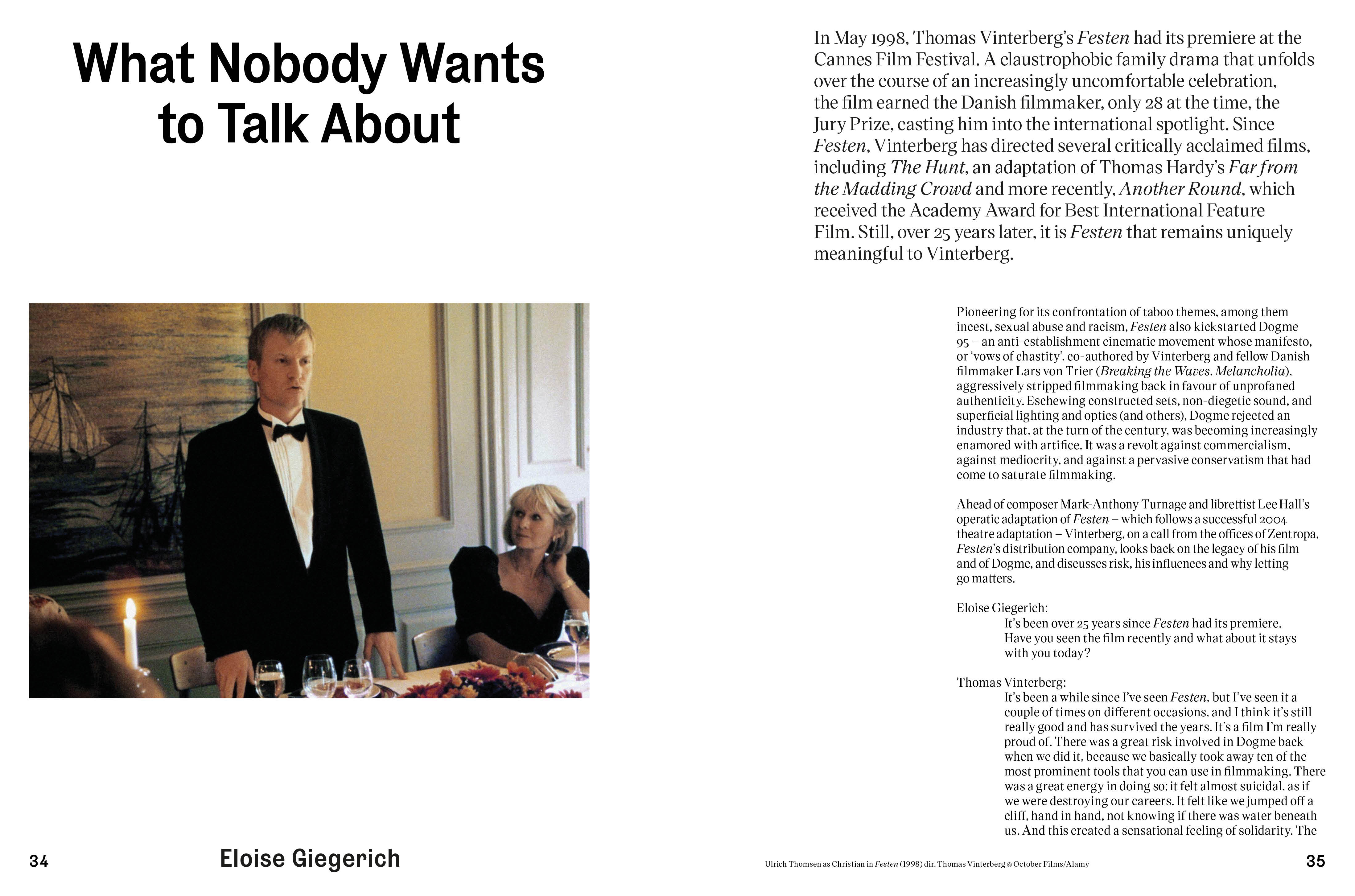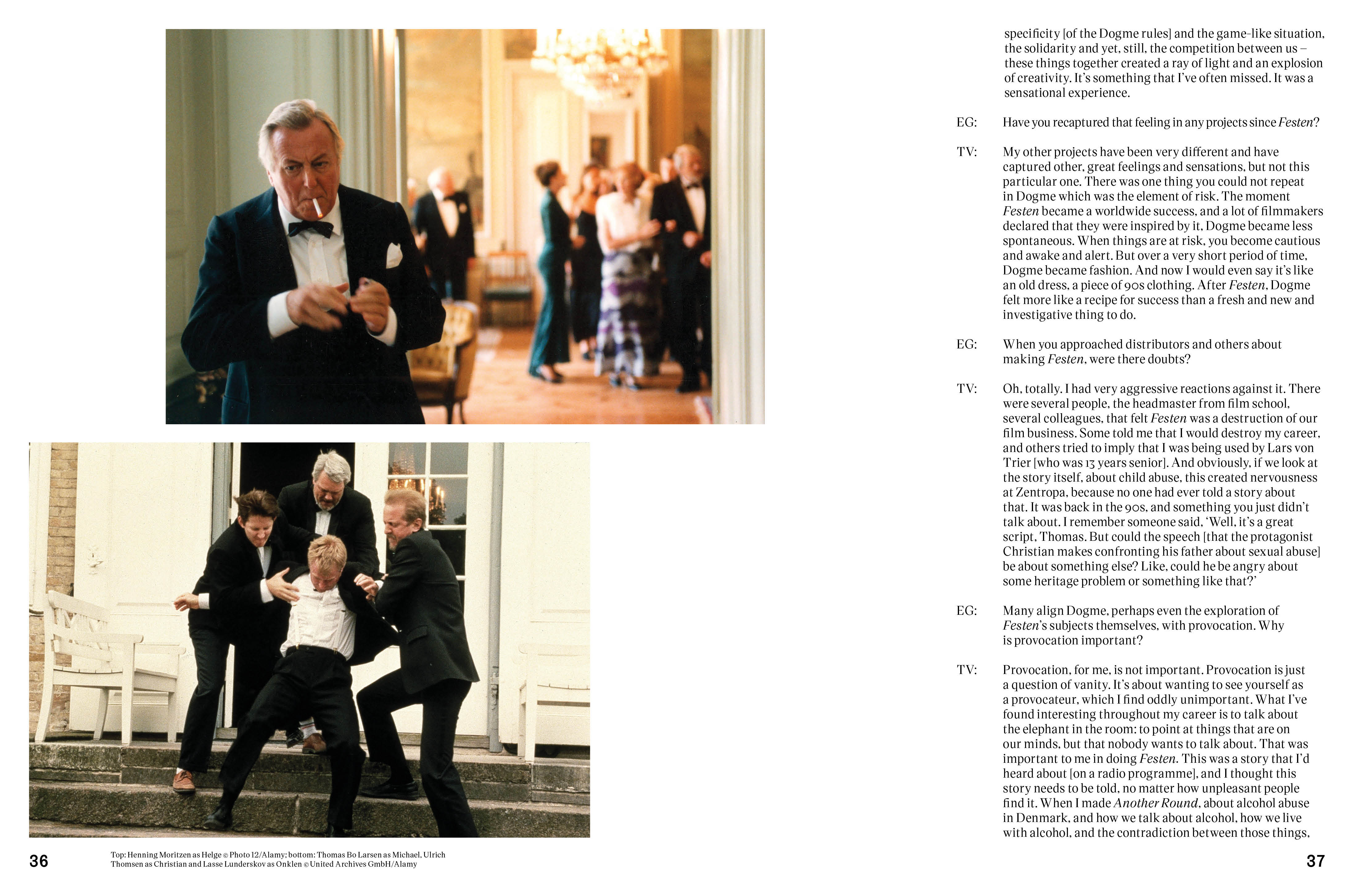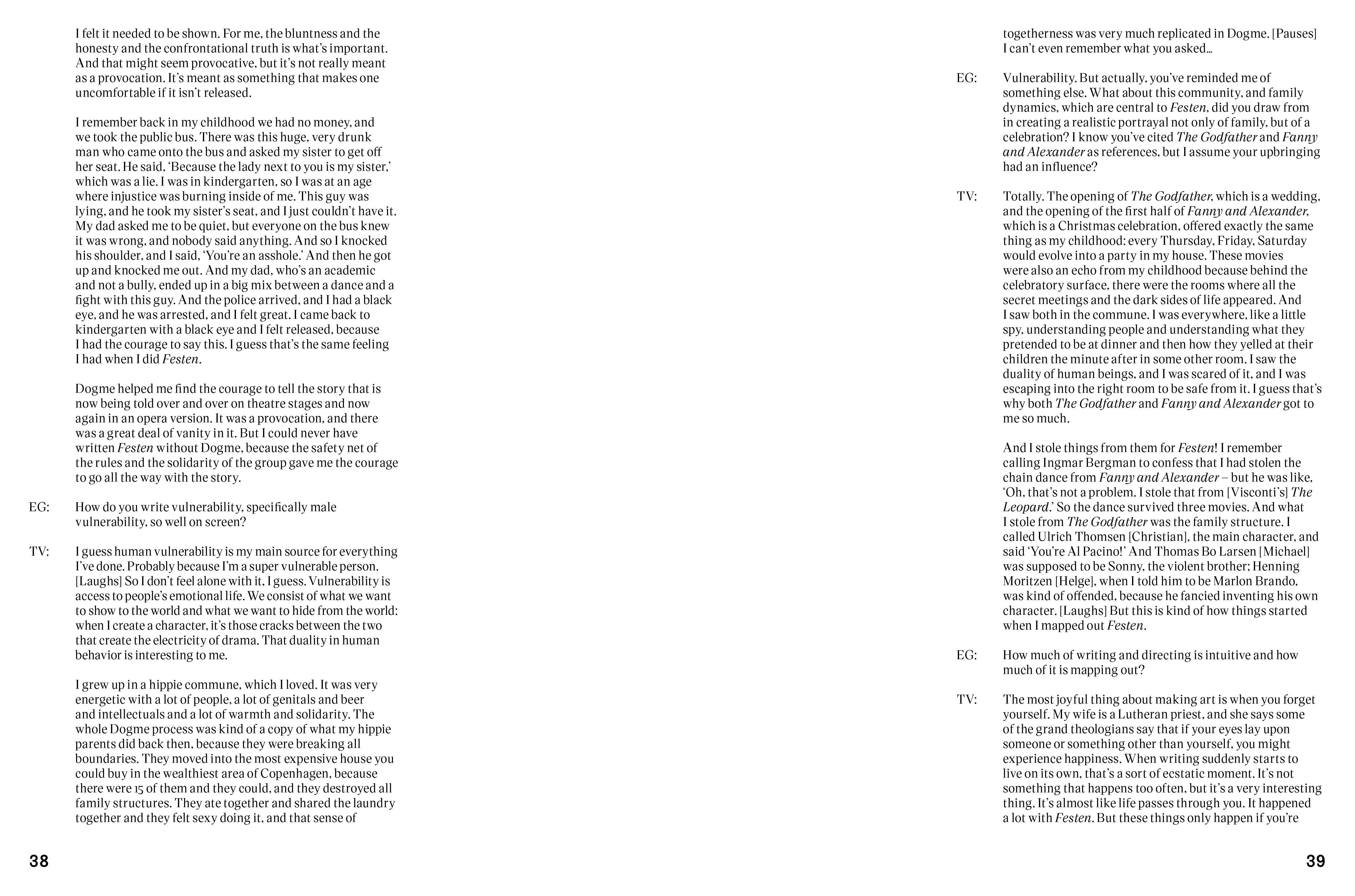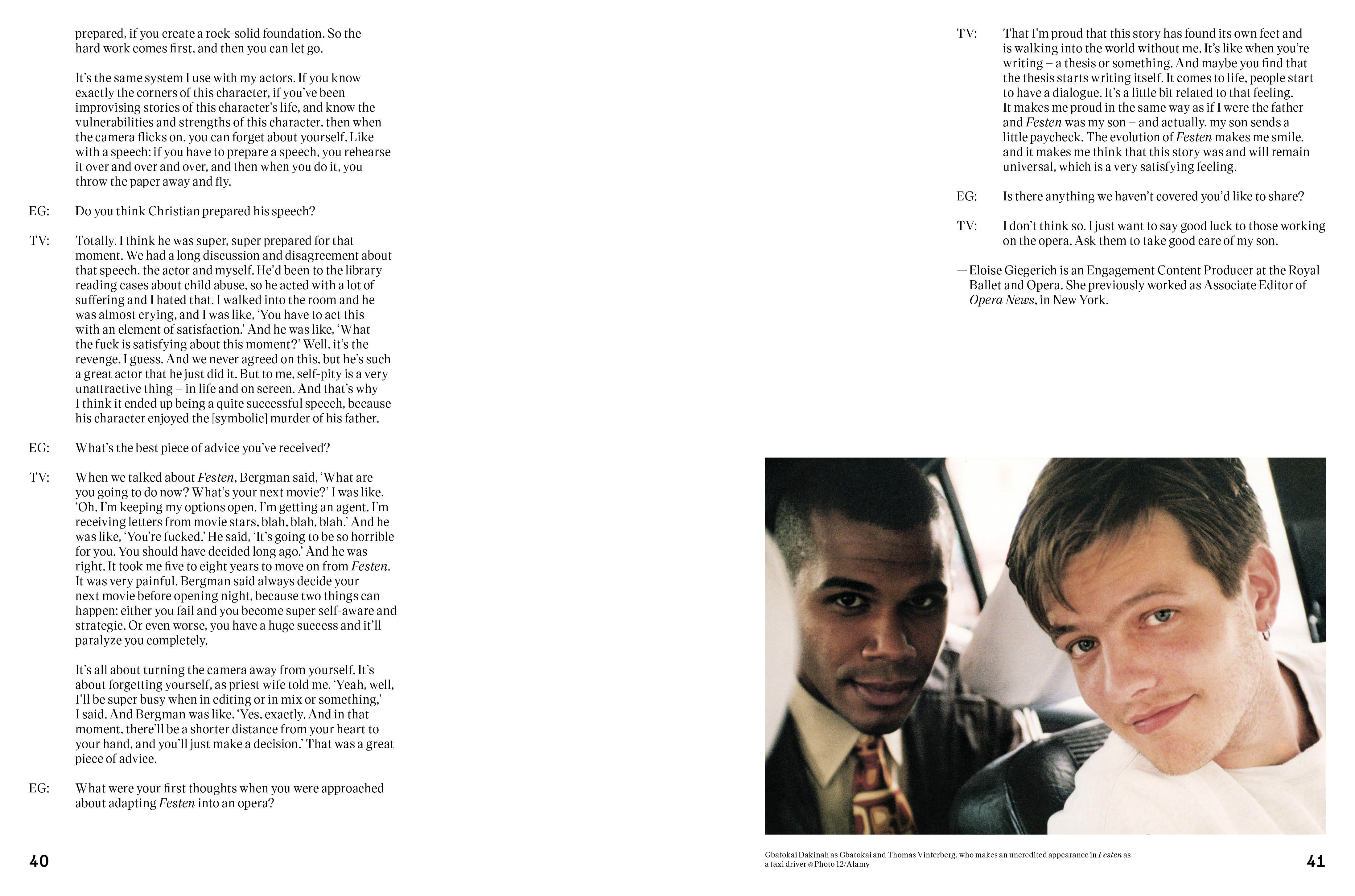
What Nobody Wants to Talk About
Year - 2025
Festen
Royal Opera House
In May 1998, Thomas Vinterberg’s Festen had its premiere at the Cannes Film Festival. A claustrophobic family drama that unfolds over the course of an increasingly uncomfortable celebration, the film earned the Danish filmmaker, only 28 at the time, the Jury Prize, casting him into the international spotlight. Since Festen, Vinterberg has directed several critically acclaimed films, including The Hunt, an adaptation of Thomas Hardy’s Far from the Madding Crowd and more recently, Another Round, which received the Academy Award for Best International Feature Film. Still, over 25 years later, it is Festen that remains uniquely meaningful to Vinterberg.
Pioneering for its confrontation of taboo themes, among them incest, sexual abuse and racism, Festen also kickstarted Dogme 95 – an anti-establishment cinematic movement whose manifesto, or ‘vows of chastity’, co-authored by Vinterberg and fellow Danish filmmaker Lars von Trier (Breaking the Waves, Melancholia), aggressively stripped filmmaking back in favour of unprofaned authenticity. Eschewing constructed sets, non-diegetic sound, and superficial lighting and optics (and others), Dogme rejected an industry that, at the turn of the century, was becoming increasingly enamored with artifice. It was a revolt against commercialism, against mediocrity, and against a pervasive conservatism that had come to saturate filmmaking.
Ahead of composer Mark-Anthony Turnage and librettist Lee Hall’s operatic adaptation of Festen – which follows a successful 2004 theatre adaptation – Vinterberg, on a call from the offices of Zentropa, Festen’s distribution company, looks back on the legacy of his film and of Dogme, and discusses risk, his influences and why letting go matters.
Eloie Giegerich: It’s been over 25 years since Festen had its premiere. Have you seen the film recently and what about it stays with you today?
Thomas Vinterberg: It’s been a while since I’ve seen Festen, but I’ve seen it a couple of times on different occasions, and I think it’s still really good and has survived the years. It’s a film I’m really proud of. There was a great risk involved in Dogme back when we did it, because we basically took away ten of the most prominent tools that you can use in filmmaking. There was a great energy in doing so: it felt almost suicidal, as if we were destroying our careers. It felt like we jumped off a cliff, hand in hand, not knowing if there was water beneath us. And this created a sensational feeling of solidarity. The specificity [of the Dogme rules] and the game-like situation, the solidarity and yet, still, the competition between us – these things together created a ray of light and an explosion of creativity. It’s something that I’ve often missed. It was a sensational experience.
EG: Have you recaptured that feeling in any projects since Festen?
TV: My other projects have been very different and have captured other, great feelings and sensations, but not this particular one. There was one thing you could not repeat in Dogme which was the element of risk. The moment Festen became a worldwide success, and a lot of filmmakers declared that they were inspired by it, Dogme became less spontaneous. When things are at risk, you become cautious and awake and alert. But over a very short period of time, Dogme became fashion. And now I would even say it’s like an old dress, a piece of 90s clothing. After Festen, Dogme felt more like a recipe for success than a fresh and new and investigative thing to do.
EG: When you approached distributors and others about making Festen, were there doubts?
TV: Oh, totally. I had very aggressive reactions against it. There were several people, the headmaster from film school, several colleagues, that felt Festen was a destruction of our film business. Some told me that I would destroy my career, and others tried to imply that I was being used by Lars von Trier [who was 13 years senior]. And obviously, if we look at the story itself, about child abuse, this created nervousness at Zentropa, because no one had ever told a story about that. It was back in the 90s, and something you just didn’t talk about. I remember someone said, ‘Well, it’s a great script, Thomas. But could the speech [that the protagonist Christian makes confronting his father about sexual abuse] be about something else? Like, could he be angry about some heritage problem or something like that?’
EG: Many align Dogme, perhaps even the exploration of Festen’s subjects themselves, with provocation. Why is provocation important?
TV: Provocation, for me, is not important. Provocation is just a question of vanity. It’s about wanting to see yourself as a provocateur, which I find oddly unimportant. What I’ve found interesting throughout my career is to talk about the elephant in the room: to point at things that are on our minds, but that nobody wants to talk about. That was important to me in doing Festen. This was a story that I’d heard about [on a radio programme], and I thought this story needs to be told, no matter how unpleasant people find it. When I made Another Round, about alcohol abuse in Denmark, and how we talk about alcohol, how we live with alcohol, and the contradiction between those things, I felt it needed to be shown. For me, the bluntness and the honesty and the confrontational truth is what’s important. And that might seem provocative, but it’s not really meant as a provocation. It’s meant as something that makes one uncomfortable if it isn’t released.
I remember back in my childhood we had no money, and we took the public bus. There was this huge, very drunk man who came onto the bus and asked my sister to get off her seat. He said, ‘Because the lady next to you is my sister,’ which was a lie. I was in kindergarten, so I was at an age where injustice was burning inside of me. This guy was lying, and he took my sister’s seat, and I just couldn’t have it. My dad asked me to be quiet, but everyone on the bus knew it was wrong, and nobody said anything. And so I knocked his shoulder, and I said, ‘You’re an asshole.’ And then he got up and knocked me out. And my dad, who’s an academic and not a bully, ended up in a big mix between a dance and a fight with this guy. And the police arrived, and I had a black eye, and he was arrested, and I felt great. I came back to kindergarten with a black eye and I felt released, becauseI had the courage to say this. I guess that’s the same feeling I had when I did Festen.
Dogme helped me find the courage to tell the story that is now being told over and over on theatre stages and now again in an opera version. It was a provocation, and there was a great deal of vanity in it. But I could never have written Festen without Dogme, because the safety net of the rules and the solidarity of the group gave me the courage to go all the way with the story.
EG: How do you write vulnerability, specifically male vulnerability, so well on screen?
TV: I guess human vulnerability is my main source for everything I’ve done. Probably because I’m a super vulnerable person. [Laughs] So I don’t feel alone with it, I guess. Vulnerability is access to people’s emotional life. We consist of what we want to show to the world and what we want to hide from the world: when I create a character, it’s those cracks between the two that create the electricity of drama. That duality in human behavior is interesting to me.
I grew up in a hippie commune, which I loved. It was very energetic with a lot of people, a lot of genitals and beer and intellectuals and a lot of warmth and solidarity. The whole Dogme process was kind of a copy of what my hippie parents did back then, because they were breaking all boundaries. They moved into the most expensive house you could buy in the wealthiest area of Copenhagen, because there were 15 of them and they could, and they destroyed all family structures. They ate together and shared the laundry together and they felt sexy doing it, and that sense of togetherness was very much replicated in Dogme. [Pauses] I can’t even remember what you asked…
EG: Vulnerability. But actually, you’ve reminded me of something else. What about this community, and family dynamics, which are central to Festen, did you draw from in creating a realistic portrayal not only of family, but of a celebration? I know you’ve cited The Godfather and Fanny and Alexander as references, but I assume your upbringing had an influence?
TV: Totally. The opening of The Godfather, which is a wedding, and the opening of the first half of Fanny and Alexander, which is a Christmas celebration, offered exactly the same thing as my childhood: every Thursday, Friday, Saturday would evolve into a party in my house. These movies were also an echo from my childhood because behind the celebratory surface, there were the rooms where all the secret meetings and the dark sides of life appeared. And I saw both in the commune. I was everywhere, like a little spy, understanding people and understanding what they pretended to be at dinner and then how they yelled at their children the minute after in some other room. I saw the duality of human beings, and I was scared of it, and I was escaping into the right room to be safe from it. I guess that’s why both The Godfather and Fanny and Alexander got to me so much.
And I stole things from them for Festen! I remember calling Ingmar Bergman to confess that I had stolen the chain dance from Fanny and Alexander – but he was like, ‘Oh, that’s not a problem. I stole that from [Visconti’s] The Leopard.’ So the dance survived three movies. And what I stole from The Godfather was the family structure. I called Ulrich Thomsen [Christian], the main character, and said ‘You’re Al Pacino!’ And Thomas Bo Larsen [Michael] was supposed to be Sonny, the violent brother; Henning Moritzen [Helge], when I told him to be Marlon Brando, was kind of offended, because he fancied inventing his own character. [Laughs] But this is kind of how things started when I mapped out Festen.
EG: How much of writing and directing is intuitive and how much of it is mapping out?
TV: The most joyful thing about making art is when you forget yourself. My wife is a Lutheran priest, and she says some of the grand theologians say that if your eyes lay upon someone or something other than yourself, you might experience happiness. When writing suddenly starts to live on its own, that’s a sort of ecstatic moment. It’s not something that happens too often, but it’s a very interesting thing. It’s almost like life passes through you. It happened a lot with Festen. But these things only happen if you’re prepared, if you create a rock-solid foundation. So the hard work comes first, and then you can let go.
It’s the same system I use with my actors. If you know exactly the corners of this character, if you’ve been improvising stories of this character’s life, and know the vulnerabilities and strengths of this character, then when the camera flicks on, you can forget about yourself. Like with a speech: if you have to prepare a speech, you rehearse it over and over and over, and then when you do it, you throw the paper away and fly.
EG: Do you think Christian prepared his speech?
TV: Totally. I think he was super, super prepared for that moment. We had a long discussion and disagreement about that speech, the actor and myself. He’d been to the library reading cases about child abuse, so he acted with a lot of suffering and I hated that. I walked into the room and he was almost crying, and I was like, ‘You have to act this with an element of satisfaction.’ And he was like, ‘What the fuck is satisfying about this moment?’ Well, it’s the revenge, I guess. And we never agreed on this, but he’s such a great actor that he just did it. But to me, self-pity is a very unattractive thing – in life and on screen. And that’s why I think it ended up being a quite successful speech, because his character enjoyed the [symbolic] murder of his father.
EG: What’s the best piece of advice you’ve received?
TV: When we talked about Festen, Bergman said, ‘What are you going to do now? What’s your next movie?’ I was like, ‘Oh, I’m keeping my options open. I’m getting an agent. I’m receiving letters from movie stars, blah, blah, blah.’ And he was like, ‘You’re fucked.’ He said, ‘It’s going to be so horrible for you. You should have decided long ago.’ And he was right. It took me five to eight years to move on from Festen. It was very painful. Bergman said always decide your next movie before opening night, because two things can happen: either you fail and you become super self-aware and strategic. Or even worse, you have a huge success and it’ll paralyze you completely.
It’s all about turning the camera away from yourself. It’s about forgetting yourself, as priest wife told me. ‘Yeah, well, I’ll be super busy when in editing or in mix or something,’ I said. And Bergman was like, ‘Yes, exactly. And in that moment, there’ll be a shorter distance from your heart to your hand, and you’ll just make a decision.’ That was a great piece of advice.
EG: What were your first thoughts when you were approached about adapting Festen into an opera?
TV: That I’m proud that this story has found its own feet and is walking into the world without me. It’s like when you’re writing – a thesis or something. And maybe you find that the thesis starts writing itself. It comes to life, people start to have a dialogue. It’s a little bit related to that feeling. It makes me proud in the same way as if I were the father and Festen was my son – and actually, my son sends a little paycheck. The evolution of Festen makes me smile, and it makes me think that this story was and will remain universal, which is a very satisfying feeling.
EG: Is there anything we haven’t covered you’d like to share?
TV: I don’t think so. I just want to say good luck to those working on the opera. Ask them to take good care of my son.



